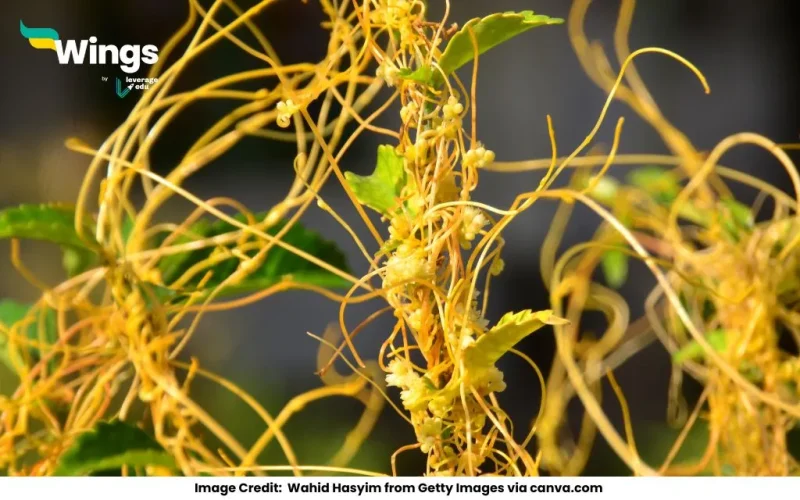Cuscuta (Amarbel) is a parasitic plant that lacks chlorophyll and derives nutrients from host plants, weakening them. All animals depend on plants directly (herbivores consuming plants) or indirectly (carnivores eating herbivores). Plants are the primary producers, providing food and oxygen, which form the foundation of the food chain and sustain all life on Earth.
Complete Answer:
A) What is Cuscuta (Amarbel)? Why is Cuscuta called a parasite?
Cuscuta, commonly known as Amarbel, is a parasitic plant that lacks chlorophyll and, therefore, cannot perform photosynthesis. It appears as thin, yellow, or orange thread-like stems that wrap around the host plant.
Cuscuta is called a parasite because it attaches itself to a host plant and derives nutrients, water, and minerals from the host plant’s vascular system, depriving the host of essential nutrients. This can weaken the host plant and, in severe cases, lead to its death.
B) ‘All animals depend upon plants for their food.’ Justify this statement.
All animals depend on plants for food, either directly or indirectly:
- Direct dependence: Herbivores like cows, goats, and deer eat plants directly to obtain their energy and nutrients. They rely on plant parts such as leaves, stems, fruits, and seeds for sustenance.
- Indirect dependence: Carnivores like lions and tigers depend on herbivores for food. Since herbivores survive by consuming plants, the energy stored in plants ultimately supports the entire food chain.
- Omnivores: Animals like humans and bears, which eat both plants and animals, also depend on plants either directly (by eating plants) or indirectly (by consuming animals that have fed on plants).
- Oxygen production: Besides food, plants produce oxygen through photosynthesis, which is essential for the survival of all animals, including humans.
Thus, plants are the primary producers in the ecosystem, forming the foundation of the food chain and supporting all other living organisms.
Common Biology Questions:
 45,000+ students trusted us with their dreams. Take the first step today!
45,000+ students trusted us with their dreams. Take the first step today!


 One app for all your study abroad needs
One app for all your study abroad needs










